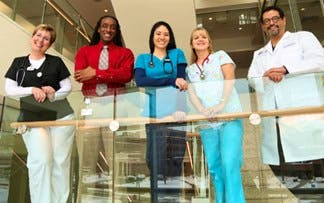 Besides their varied geographical destinations, our School of Nursing graduates are taking health care in many new directions, leading hospital units and clinical initiatives, developing and driving improvements in patient care, and charting new, collaborative paths of research. They are sharing their insights and perspectives as educators and mentors, holding administrative roles, presenting in board rooms, and influencing positive change—not only within the nursing profession—but across health care systems and communities.
Besides their varied geographical destinations, our School of Nursing graduates are taking health care in many new directions, leading hospital units and clinical initiatives, developing and driving improvements in patient care, and charting new, collaborative paths of research. They are sharing their insights and perspectives as educators and mentors, holding administrative roles, presenting in board rooms, and influencing positive change—not only within the nursing profession—but across health care systems and communities.
Karrah Hurd, RN
SMH Staff Nurse, Short Stay Medical-Surgical Unit
If Karrah Hurd is at all nervous about being the first nursing student on the Rochester Academy of Medicine (RAOM) executive board—open only to doctors until a change in policy last year—it doesn’t show.
“It’s a new experience for me,” she said. “But sometimes you need to stretch beyond your comfort zone for something you care about. I’m passionate about improving collaboration across health professions, and this is a chance to be part of that conversation at a high level.”
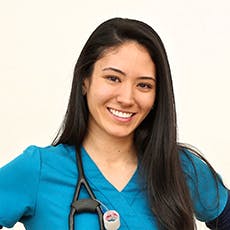
Karrah was recruited to the RAOM board—now inclusive to health care professionals of all disciplines—precisely because she isn’t afraid to let her voice be heard. In just two years since earning her bachelor’s degree through the APNN, she has been at the forefront of efforts to improve team-based care across the Medical Center. In 2014, she co-founded the UR chapter of Primary Care Progress (PCP), the first in the country to include both nursing and medical students. The national organization aims to revitalize the primary care system by mobilizing students across professions to lead, innovate, and advocate for improvements.
“If we can learn to work together at the student level, we will be more effective teams when we care for patients,” said Karrah, who is studying to become a family nurse practitioner and hopes to one day be an administrator and teacher. “The future of health care depends upon our ability to break from old patterns, and create something better.”
She also co-leads a student-run research project within Strong Memorial Hospital (funded by PCP, the American Association of Medical Colleges, and the Camden Coalition), which is exploring ways to reduce emergency visits and admissions for high-utilization patients. All of this is in addition to caring for patients and families on Strong’s short stay medical-surgical unit, where she also precepts new nurses and nursing students, serves on the unit council, and represents the unit on Strong’s professional nursing committee.
The Connecticut native credits her School of Nursing teachers, and the vast clinical experiences she received, for her confidence and sense of purpose. “(Assistant professor of clinical nursing) Patrick Hopkins, DNP, RN, C-PNP, NNPP, was my first professor, and inspired me to work hard in the classroom, and have a voice in the medical community,” she said. “(Professor of clinical nursing) Jane Tuttle, PhD, RN, FNP-BC, FAANP, taught me to pursue my ideas, and persevere in the face of setbacks. My teachers helped me understand what a privilege it is to care for patients. It’s an opportunity to be an intimate part of someone’s life, and I take that role very seriously.”
In addition to being an RN at Strong Memorial Hospital, Karrah serves on the Rochester Academy of Medicine executive board and co-chairs the UR chapter of Primary Care Progress. Now working toward her master’s degree, she plans to become a family nurse practitioner. In May, she married UR School of Medicine and Dentistry graduate, Jacob Gantz, MD.
Ann Zimmerman, RN
GCH Senior Level III Nurse
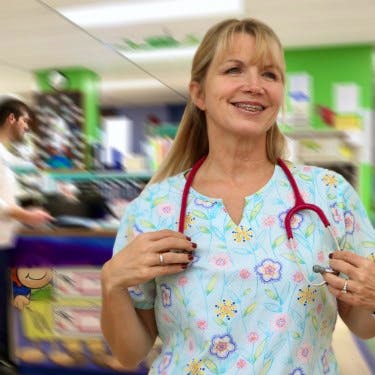 Annie Zimmerman is known and remembered for her colorful scrubs, among other things in her work at Golisano Children’s Hospital. The scuba diver, jungle explorer, and longtime cheerleading coach has a passion for living life to the fullest, and channels that passion into the attention she gives to hospitalized children and their families.
Annie Zimmerman is known and remembered for her colorful scrubs, among other things in her work at Golisano Children’s Hospital. The scuba diver, jungle explorer, and longtime cheerleading coach has a passion for living life to the fullest, and channels that passion into the attention she gives to hospitalized children and their families.
“Putting a smile on the faces of others, and helping others believe in themselves, is what makes me happiest,” she said. “I like to say, if you can’t see the bright side of life then polish the dull side.”
More than two decades ago, as a single mom, Annie earned an associate’s degree in nursing, promising herself that when her son was older she’d return to college. She paid the bills by working in adult orthopedics at Rochester General Hospital, and as a school nurse, until a 7th grade girl with a terminal brain tumor prompted her to rethink her career.
Since 2003, she has been caring for children hospitalized for orthopedic trauma and surgeries, as well as those with diabetes and cystic fibrosis. As a nurse leader in the Center for Nursing Professional Development, she also coordinates the orientation and training of nurse technicians.
“Whether helping a child or parent learn to give an insulin injection, or sharing what I know with new nurses, teaching is where I feel I make the biggest impact,” she says. That desire to pass along her nursing experience to future generations of nurses moved her to enroll in the RN to BS program. She’ll graduate in May 2016 (when her son graduates too), then plans to pursue a master’s in nursing education and become a clinical nurse educator.
“Every course I’m taking is so applicable,” she says. “I love learning the ‘why’ behind everything now. It’s one thing to give a diuretic and know how it affects a patient, but it’s another to take a pathophysiology course and understand what’s actually happening inside the body.”
On her unit, young eyes light up when she shares her videos of scuba diving near Honduras (ask her about the shark she once swam toward) or hiking in the rainforests of Costa Rica. “It takes their minds off things,” she says. “I believe in the power of positive thinking, having a sense of humor, and living like children do: open to new experiences. That’s a good way to be.”
Ann looks forward to bringing her three decades of experience to a clinical teaching role. The former cheerleading coach, who learned to scuba dive at age 51, says experiencing the loss of a child is by far the most difficult part of her work. “You never get over it. You’re not supposed to. Every person you meet, every experience you have, becomes part of who you are.”
Luis Rosario-McCabe, MS, RN, WHNP-BC
Women’s Center at Lattimore Nurse Practitioner
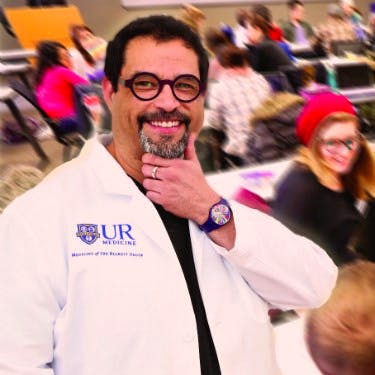 Luis can pinpoint the moment he knew he wanted to work in women’s health. “This is going to sound weird, but it was when I was observing my first delivery, and I saw the placenta,” he says. “Everyone says, ‘What about the baby?’ That was wonderful too, but to me the most amazing thing was realizing a woman’s body can nourish a baby in this miraculous way.”
Luis can pinpoint the moment he knew he wanted to work in women’s health. “This is going to sound weird, but it was when I was observing my first delivery, and I saw the placenta,” he says. “Everyone says, ‘What about the baby?’ That was wonderful too, but to me the most amazing thing was realizing a woman’s body can nourish a baby in this miraculous way.”
The ability to see something through a different lens is just one thing that sets Luis apart—as a practitioner and a teacher. Another is his open and approachable nature that makes him someone people immediately trust.
“I’m laid-back and I have no filters,” says the southern California native. “I just try to be very ‘real’ with patients without ever judging, so they can feel safe confiding in me, and I can care for the whole person.”
He is one of seven NPs and eight resident physicians who provide obstetric and gynecological care to 30,000 patients a year at the Lattimore Women’s Center, which aims to improve access and health outcomes for socioeconomically disadvantaged women. In his 13 years with the practice, he’s treated women from adolescence through menopause, and developed particular interest in transgender health—now the focus of his DNP studies.
Beyond practicing and studying, he cherishes the time he spends in the classroom, teaching obstetrics to students in the Accelerated Programs for Non-Nurses. The 12-year clinical faculty member says he hesitated about teaching at first.
“I was a good student here, but I was kind of a class clown,” said Luis, who names professor emeritus of clinical nursing Jeanne Grace, PhD, RN, WHNP, as a longtime mentor. “When they asked me to teach, I said ‘Have you lost your mind?’ But it turned out to be a perfect fit for my personality, and my roles fuel one another. I love my patients, and never want to stop practicing. But I also love teaching. The enthusiasm of the students reminds me why I’m doing what I’m doing.”
The students in Luis’ classes benefit from his many years of experience in women’s health, as well as his engaging teaching style. With an interest in transgender health and desire to solidify his coveted faculty role at the School, he’s now working toward his DNP. A talented singer, he studied opera at the Eastman School of Music before becoming a nurse. In his spare time, he and his family enjoy welcoming friends to their alpaca farm in Riga.
Linda Schmitt, RN
SMH Nursing Retention Officer
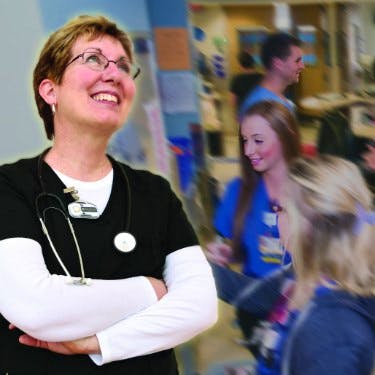 Growing up on a dairy farm in Central New York, Linda Schmitt drove tractors, fed the cows, and cleaned milking machines. Becoming a nurse might have been the furthest thing from her mind, had it not been for her mom.
Growing up on a dairy farm in Central New York, Linda Schmitt drove tractors, fed the cows, and cleaned milking machines. Becoming a nurse might have been the furthest thing from her mind, had it not been for her mom.
“My mom was sick and hospitalized a lot when I was a young child,’’ says Schmitt. “Without realizing what was happening, I developed an interest and curiosity for illness and wellness issues and what was happening in the hospital. It had a lasting impact on me.’’
Today it’s Linda who is making an impact, most recently as senior nurse manager for the Combined Acute Medical Unit at Strong Memorial Hospital, where she coordinated 95 staff members and the care of 50 patients. It was the completion of her master’s degree in the Clinical Nurse Leader track at the School of Nursing in May 2012, that propelled her career path, she says.
“Completing my graduate education allowed me to return to a clinical role as a nurse manager, which I don’t think I would have done without the new knowledge and confidence I gained,’’ she says. It’s an education that keeps leading her in new directions.
In June, Linda brought her 36 years of nursing experience to a new role as nursing retention officer for Strong, where she will help to influence the journeys of other nurses and strengthen the hospital’s nursing workforce. Her early role models in the Surgical Intensive Care Unit taught her to “put patients first, work hard, and always strive for excellence.” Now she’s passionate about paying it forward.
Most recently, Linda led a critical effort to expand the nursing team on the Combined Acute Medical Unit, by hiring 55 nurses in one year. “It’s very meaningful to work with incredible teammates who are highly committed to doing the right thing for patients,’’ she says. “I’m thankful for the chance to help others grow and develop.’’
Completing her graduate work at the School was an easy and obvious choice because Linda was able to bridge her work and education within one University setting. She recalls the leadership course taught by professor of clinical nursing Tobie Olsan, PhD, MPA, RN, CNL, NEA-BC, FNAP, as being especially relevant, teaching among other things, “to look at every person, every situation as a whole, and asking ‘Why?’’’
Linda derives her greatest enjoyment from working with dedicated teammates and helping other nurses grow and develop. In 2014 she led a critical effort to double the size of her unit’s nursing team, hiring 55 nurses in one year. She grew up on a farm, but when her mom was hospitalized, it sparked her curiosity in health care. Today, her two daughters—a nurse and social worker—have followed in her footsteps.
Mitchell J. Wharton, PhD, RN, FNP-BC, CNS
Assistant Professor of Clinical Nursing; Family Nurse Practitioner, Center for Perioperative Medicine
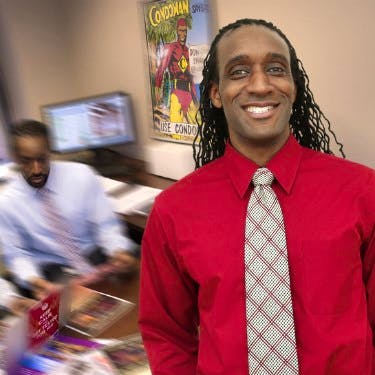 Growing up in Chester, Pa., Mitchell Wharton and his sister often tagged along while his mother worked as a nurse’s aide in a psychiatric center. “As a single mother, she instilled in us the principles of hard work and integrity,” he said. “She demonstrated the healing property of compassion and taught us to interact with patients as regular people, not as someone with a certain diagnosis.”
Growing up in Chester, Pa., Mitchell Wharton and his sister often tagged along while his mother worked as a nurse’s aide in a psychiatric center. “As a single mother, she instilled in us the principles of hard work and integrity,” he said. “She demonstrated the healing property of compassion and taught us to interact with patients as regular people, not as someone with a certain diagnosis.”
But young Mitchell didn’t want to become a nurse. He wanted to be a scientist. It wasn’t until his older sister went on to earn a master’s degree in nursing, that he realized you could do both.
“I watched in awe as she progressed through nursing school, and completed her master’s thesis on breast cancer screening. I discovered that nursing careers extend beyond supervised patient care, and was excited to learn I could become an independent practitioner and a researcher, too.”
Mitchell has accomplished all of this and more. On a typical day you might find him in a nurse practitioner-run clinic providing pre-surgical health assessments and educating patients about anesthesia. Or you may spot him preparing course materials, grading papers, advising, or teaching students in the accelerated programs, RN to BS program, or master’s programs.
But while he has the heart of a practitioner and teacher, he has the soul of an investigator. “Only with evidence can we identify the best ways to resolve our most complex and prevalent health issues,” he said. His goal is to be an NIH (R01)-sponsored independent scientist and tenured professor. “I love digging for answers. I can spend hours poring over scientific literature, or writing abstracts and manuscripts, and feel like no time has passed at all.”
Driven by intellectual curiosity and a deep social consciousness, he is a scientist on the rise, working to resolve health disparities in marginalized groups, particularly in HIV prevention. He is currently leading a pilot study in collaboration with Ed Brockenbrough, PhD, assistant professor at the Warner School of Education. Through interviews and data collection, they are exploring the ways networked technologies (Facebook, Tumblr, etc.) are used by young black men who have sex with men. The results will set the stage to explore new HIV-prevention strategies.
Wharton is also examining the impact of structural barriers (poverty, access to care), social contextual issues (stigma and discrimination) and psychological factors (mental health, sexual identity disclosure, family and peer support) that these men experience routinely, yet receive little research attention.
He chose to pursue his PhD at SON for its “national reputation for a rigorous program in research methodology,” and the chance to be mentored by senior researchers like Harriet Kitzman, PhD, RN, FAAN, and James McMahon, PhD, who taught him how to develop and sustain research interactions with individuals and communities.
“What I didn’t expect was the level of career support I would get, even from faculty outside my area,” he says. “My dreams have become reality here.”
When not practicing, teaching, or collaborating with researchers, Mitchell likes to explore Rochester by car, foot, or bicycle.

